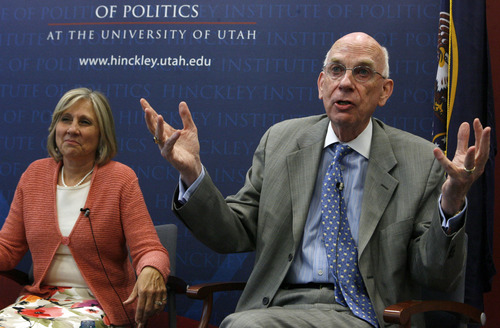This is an archived article that was published on sltrib.com in 2012, and information in the article may be outdated. It is provided only for personal research purposes and may not be reprinted.
Bob Bennett is not the only person out there who feels aggrieved that a law stopping him from doing something he wants to do is a bad idea because he knows, deep down, that his motives are pure.
Maybe they are. Maybe all the money the former U.S. senator from Utah can now make as a registered lobbyist will be untainted by special interest influence peddling because the interests of his clients — universities and government agencies in Utah, financial services corporations — are not so different from the interests of the nation as a whole.
Still, it is sad to see that a man as intelligent and as dedicated to public service as Bennett doesn't see the point of the limited ban on former senators engaging in any direct lobbying of their former colleagues.
The so-called cooling-off period imposed on former members of Congress might even be, as Bennett explained to The Salt Lake Tribune in an article Monday, constitutionally suspect. Just because you've been an elected official doesn't mean you've waived your First Amendment rights to speak and petition. And Bennett has a point when he says legally selling his expertise to those who can lobby isn't all that different from the direct lobbying activities that are banned.
But the good senator seems to forget how he gained all that special knowledge and experience. It all happened while he was on the public dime. No matter how bright Bennett might have been without three Senate terms on his resume, the fact that he was a member of that most exclusive club gives him not only Pennsylvania Avenue street smarts, but a personal relationship with many former colleagues who are still making policy on a multitude of issues.
A permanent ban on former members of Congress lobbying or consulting would be unenforceable and legally iffy. But the current cooling-off period should make it more likely that sitting lawmakers will make decisions based on the needs of their constituents, not on what would increase their value to the law firm on the other side of the revolving door.
The former senator compares his situation to that of a professional athlete who, upon retirement, sells his knowledge as a coach or TV commentator. But those are games, not governance. It is also common for broadcasters, and for high-level business executives, to have non-compete clauses in their contracts, which forbid them from taking knowledge, or star power, paid for by one company and selling it to another.
That's what the lobbying ban is, a non-compete clause that at least makes it more difficult for someone who made himself valuable while serving the public interest to turn around and immediately profit by promoting private concerns.



